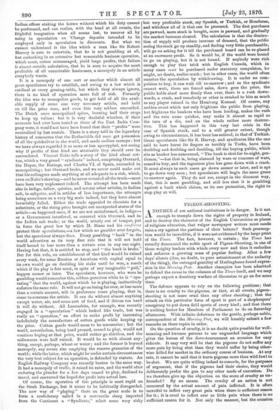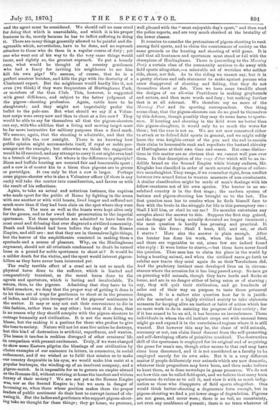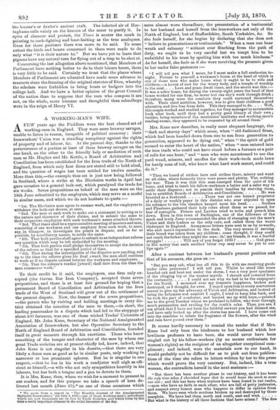PIGEON-SHOOTING.
ANOTHER of our national institutions is in danger. Is it not enough to trample down the rights of property in Ireland, and to destroy the character of the English Universities as places of religious education, that vulgar newspaper writers must needs raise a cry against the pastimes of their betters? Such presump- tion would be incredible, if it were not evidenced by the large print of the Times. The fact, however, is certain ; the Times has roundly denounced the noble sport of Pigeon-Shooting, in one of those weighty leaders with which every now and then it embodies and enforces a growing mass of popular feeling. After a few days' silence (due, no doubt, to pure astonishment at the audacity of the thing), the outraged gentility of Hurlinghame found expres- sion in the Morning Post. Another champion has been admitted to defend the cause in the columns of the Times itself, and we may perhaps expect a desultory warfare of discussion to go on for some time. ANOTHER of our national institutions is in danger. Is it not enough to trample down the rights of property in Ireland, and to destroy the character of the English Universities as places of religious education, that vulgar newspaper writers must needs raise a cry against the pastimes of their betters? Such presump- tion would be incredible, if it were not evidenced by the large print of the Times. The fact, however, is certain ; the Times has roundly denounced the noble sport of Pigeon-Shooting, in one of those weighty leaders with which every now and then it embodies and enforces a growing mass of popular feeling. After a few days' silence (due, no doubt, to pure astonishment at the audacity of the thing), the outraged gentility of Hurlinghame found expres- sion in the Morning Post. Another champion has been admitted to defend the cause in the columns of the Times itself, and we may perhaps expect a desultory warfare of discussion to go on for some time.
The defence appears to rely on the following positions ; that there is no cruelty to the pigeons, or that, at all events, pigeon- shooting is not more cruel than any other shooting ; that the attack on this particular form of sport is part of a shopkeepers' consiliracy to put down field sports of every kind ; and that there is nothing better for Members of Parliament to do on Saturday afternoons. With infinite deference to the gentle, perhaps noble, correspondent of the Morning Post, we will humbly submit a few remarks on these topics in order.
On the question of cruelty, it is no doubt quite possible for well- meaning and humane persons to use unguarded language which gives the heroes of the dove-tournament an occasion for easy ridicule. It may very well be that the pigeons do not suffer any more pain by being shot than they would suffer by being other- wise killed for market in the ordinary course of business. At any rate, it cannot be said that it hurts pigeons more than wild fowl to be shot. We are quite willing indeed to concede, for the purposes of argument, that if the pigeons had their choice, they would deliberately prefer the gun to any other mode of execution. Do we therefore give up the objection on the score of cruelty as un- founded? By no means. The cruelty of an action is not measured by the actual amount of pain inflicted. It is often merciful to inflict very great pain when there is sufficient reason for it ; it is cruel to inflict ever so little pain when there is no sufficient reason for it. Not only the manner, but the occasion and the agent must be considered. We should call no man cruel for doing that which is unavoidable, and which it is his proper business to do, merely because he has to inflict suffering in doing it. There are many things generally allowed to be painful and dis- agreeable which, nevertheless, have to be done, and no reproach attaches to those who do them in a regular course of duty ; yet one who went out of his way to do the very same things would incur, and rightly so, the greatest reproach. To put a homely ease, what would be thought of a country gentleman who had a fancy for inviting his neighbours to see him kill his own pigs? We assume, of course, that he is a perfect amateur butcher, and kills the pigs with the dexterity of a Cincinnati expert. But the neighbours would hardly like it, not even (we think) if they were frequenters of Hurlinghame Park, or members of the Gun Club. This, however, is suggested with great diffidence, and subject to the better judgment of the pigeon - shooting profession. Again, cattle have to be slaughtered; and they might not improbably prefer the bullet to the pole-axe. But what should we say if a Volun- teer corps were every now and then to shoot at a live cow P They would be able to say for themselves all that the pigeon-shooters can say, withethe addition that a living and moving target must be far more instructive for military purposes than a fixed mark. We assume, again, that the shooting is admirable, and that the first fire kills the cow outright. There is no knowing how public opinion might accommodate itself, if royal or noble per- eonages set the example; but otherwise we think the suggestion would be ill received, and any attempt to carry it out might even lead to a breach of the peace. Yet where is the difference in principle? Bison and buffalo hunting are counted fair and honourable sport ; and a cow is of nearer kin to a bison than pigeons are to grouse -or partridges. It can only be that a cow is larger. Perhaps some pigeon-shooter who is also a Volunteer officer (if there is any .such) will take the matter into consideration, and favour us with the result of his reflections.
Again, to take an actual and notorious instance, the captives who made sport for the public of Rome by fighting in the arena -with one another or with wild beasts, lived longer and suffered not -mach more than if they had been slain on the spot where they were first taken. The men as well as the beasts were kept alive only for the games, and so far owed their preservation to the imperial sportsman. Yet these spectacles are admitted to have been the most cruel and debasing that ever disgraced a civilized community. Death and bloodshed had been before the days of the Roman Empire, and still are : not that they are in themselves light things, but the horror of the amphitheatre consisted in making them a spectacle and a source of pleasure. Why, on the Hurlinghame argument, should not all criminals condemned to death be turned loose in a pound for noble sportsmen to shoot at? It would be -a milder death for the victim, and the sport would interest pigeon- killers as they have never been interested yet.
The really terrible effect of a cruel act is not so much the physical harm done to the sufferer, which is limited and -comparatively transient, as the moral harm done to the agents and spectators, which is lasting and incalculable. To return, then, to the pigeons. Admitting that they have to be killed somehow, we deny that the proper way of getting it done is to let them out of traps for gentlemen to shoot at in the presence -of ladies, and this quite irrespective of the pigeons' sentiments in the matter. It may or may not suit their convenience to die in this fashion, rather than in any other ; but even if it does, that is no reason why- they should conspire with the pigeon-shooters to outrage humanity and civilization. It is not the mere killing we blame, but the making it a pastime for those who profess to give the tone to society. Nature will not let man live unless he destroys, but this kind of destruction is artificial, superfluous, and wanton. 'The lesson it teaches is reckless disregard of other creatures' life vin comparison with present excitement. Truly, if we were charged to show some Eastern pilgrim the blessings of our civilization by -choice examples of our eminence in letters, in commerce, in social refinement, and if we wished so to fulfil that mission as to make -oar country despicable in his eyes; we would make him assist at a popular burlesque, the winding-up of an insolvent company, and a pigeon-match. Is it impossible for us to govern an empire abroad as the Romans did, without reviving at home the insolent and vicious luxury of their society? We are not yet as the Roman Empire wse, nor as the Second Empire is ; but we seem in danger of becoming so, when those whose position makes them the proper leaders of public sentiment do their best to corrupt instead of ele- vating it. But the ladies and gentlemen who support pigeon-shoot- ing take no thought for these things ; they go home, we presume,
well pleased with the "most enjoyable day's sport," and then read the police reports, and are very much shocked at the brutality of the lower classes.
It remains to consider the pretensions of pigeon-shooting to rank among field sports, and to claim the countenance of society on the same grounds as the hunting and shooting of wild game. It is said that all huntsmen and sportsmen must stand or fall with the champions of Hurliughame. There is (according to the Morning Post) a certain class of the community anxious to do away with field sports altogether,—.a miserable set of wretches who neither ride, shoot, nor fish. As to the riding we cannot say, but it is a pretty obvious and safe statement to make against persons who avow disapproval of shooting and fishing, that they do not themselves shoot or fish. Then we have some twaddle about the designs of an all-wise Providence in making greyhounds and setters, and then mere words and fury ; but nothing further that is at all relevant. We therefore say no more of the Morning Post and its sporting correspondent. One thing seems clear, that the pigeon-shooters can do no good to themselves by this defence, though possibly they may do some harm to sports- men. If hunting and shooting in the field were no better than this pigeon-slaughter, it would only be so much the worse for them ; but the case is not so. 1Ve are not now concerned either to attack or to defend field sports in general, and we might safely leave the true knights-errant of the gun and the rod to sustain their claim to honourable rank and repudiate the bastard chivalry of Harlinghame at their own time and season. But some distinc- tions in this matter are so obvious that we cannot well pass over them. In that description of the coup d'etat which will be an in- delible brand on the Second Empire while history endures, Mr. Kinglake has classified in order of merit several degrees of collec- tive manslaughter. They range, if we remember right, from conflict between two armed forces to wanton massacre of non-combatants. A similar classification might be made of man's dealings with his fellow-creatures not of his own species. The hunter in an un- subdued country is in the first stage ; the modern system of battues and pigeon-shooting has brought us to the last. The first question man has to resolve when he finds himself face to face with the brute in the struggle for life is this peremptory one : Shall I kill him, or shall he eat me ? No moralist entertains any scruples about the answer to this. Suppose the first step gained, and the danger of being actually devoured no longer imminent ; the next question is hardly leas pressing and practical. It comes in this form: Shall I hunt, kill, and eat, or shall I starve ? Here also the answer is plain enough. After the hunter has done his work, when the land is tilled, and there are vegetables to eat, some few are indeed found who reply : It were better to starve,—but these have never faced the question. Thus man has to claim his place in the world by being a hunting animal, and when the civilized races go forth to subdue new tracts they must again do as their 'forefathers did. And the predatory instinct once developed lives on in circum- stances where the occasion for it has long passed away. So men go on pursuing wild animals, though they have herds and flocks at home, and are in no danger either of being eaten or of starving ; nay, they will quit their civilization, and go hundreds of miles out of their way on purpose to taste those primmval dangers. It is a rather nice question how far it is justifi- able for members of a highly civilized society to take elaborate measures for keeping alive an instinct or habit of action which has no more work to do in assisting the progress of that society ; for if it has ceased to be an aid, it has become an incumbrance. Those individuals in whom the old instinct crops out with unusual force might go and expend it in the unreclaim ed regions where it is still wanted. But however this may be, the chase of wild animals, necessary or not, can claim lineal descent from the self-preserving and self-developing efforts of primitive mankind. The destructive skill of the sportsman is employed for its original end of acquiring the game for man's use, though other means to that end may have since been discovered, and it is not considered as a faculty to be employed merely for its own sake. But it is a very different matter if people deliberately rear animals which are now domestic, whatever their progenitors may have been, and then make believe to hunt them, as is done nowadays in game preserves. We do not see how this can be called field sport, and we believe that many keen sportsmen do refuse so to call it, and view it with as much indig- nation as those who disapprove of field sports altogether. One would think battue-shooting a degenerate form enough, but in pigeon-shooting we find a yet lower stage of degradation. Pigeons are not game, and never were ; there is no toil, no uncertainty, not even any semblance of pursuit ; there is no trace whatever of the hunter's or fowler's ancient craft. The infected air of Hur- inghame calls vainly on the breezes of the moor to purify it. In spite of clamour and protest, the Times is nearer the mark in pointing to cock-fighting and bear-baiting as the true analogues. Even for those pastimes there was more to be said. To some extent the birds and beasts concerned in them were made to do only what "it is their nature to." But we have yet to learn that pigeons have any natural turn for flying out of a trap to be shot at.
Concerning the last allegation above mentioned, that Members of Parliament have nothing better to do in their leisure hours, there is very little to be said. Certainly we trust that the places where Members of Parliament are educated have made some advance in manners since the framing of the original statutes of Eton, whereby the scholars were forbidden to bring bears or badgers into the college hall. And we have a better opinion of the great Council of the nation than to suppose that the men who compose it are not, on the whole, more humane and thoughtful than schoolboys were in the reign of Henry VI.
































 Previous page
Previous page